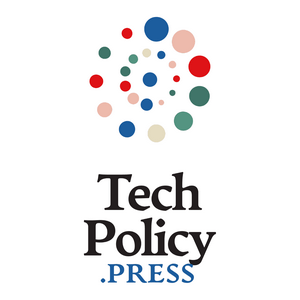354 afleveringen
- In a forthcoming paper, George Washington University Law School scholar Spencer Overton argues that the Trump administration's AI policy is consistent with its broader efforts to advance ethnonationalism. By eliminating policies intended to ensure safeguards against algorithmic bias—and recasting work on such problems as ideological threats to innovation—Trump's policies embed exclusion into the technological infrastructure of the future. As a growing body of research suggests, when AI systems operate without regulation, they default to dominant patterns that reproduce racial inequality and suppress cultural pluralism.
- A new book titled Governing Digital China offers crucial insights into China's governance ecosystem. Written by Daniela Stockmann, a professor at the Hertie School in Berlin and director of the Center for Digital Governance, and Ting Luo, an associate professor in artificial intelligence and government at the University of Birmingham, the book reveals a more complex reality than simple top-down control.
The authors show how massive tech companies like Tencent and Alibaba have become essential partners to the Chinese state, blending corporate and government power. At the same time, citizens exercise bottom-up influence, shaping how both platforms and the state respond to their needs. The result is what the authors call "popular corporatism"—a form of digital authoritarianism that operates quite differently than you might expect. - 2026 is poised to be another landmark year for the child online safety debate in the United States.
In recent years, states have passed dozens of bills aimed at expanding protections for kids as they navigate risks on social media platforms, AI chatbots and other pools, with more likely on the way. Lawmakers in Washington, meanwhile, are considering a flurry of proposals that could set a national standard on the issue. But many of these efforts are facing legal limbo as industry and some digital rights groups allege they violate constitutional rights and trample on privacy.
Tech Policy Press senior editor Cristiano Lima-Strong spoke to three experts tracking the issue to assess the current policy landscape in the United States and how it may shift in 2026, particularly as state legislators continue to take up the cause:
Amina Fazlullah is head of tech policy advocacy at Common Sense Media, a group that advocates for child online safety measures. She previously served as a tech policy fellow for Mozilla and as director of policy at the Benton Foundation.
Joel Thayer is president of the Digital Progress Institute, a think tank that advocates for age verification policies. He previously clerked for Federal Trade Commission official Maureen Ohlhausen and served as policy counsel for the tech trade group The App Association.
Kate Ruane is the director of the Free Expression Project at the Center for Democracy and Technology, a nonprofit that advocates for digital rights. She previously served as lead public policy specialist for the Wikimedia Foundation and as senior legislative counsel for the ACLU. - In what Reuters called a "mass digital undressing spree," Elon Musk is provoking outrage after his Grok chatbot responded to user prompts to remove the clothing from images of women and pose them in bikinis and to create "sexualized images of children" and post them on X. To discuss the controversy and the broader policy implications of generative AI with regard to child sexual abuse material and nonconsensual intimate imagery, Justin Hendrix spoke to Riana Pfefferkorn, a policy fellow at the Stanford Institute for Human-Centered AI and author of numerous reports and articles on these subjects, including for Tech Policy Press.
- Tech Policy Press fellow Anika Collier Navaroli joined Justin Hendrix to discuss insights from her special 2025 series of podcasts, Through to Thriving. They discussed insights from her interviews over the course of the year with Ellen Pao, Jerrel Peterson, Alice Hunsberger, Vaishnavi J, Desmond Patton, Nora Benavidez, Mimi Ọnụọha, Timnit Gebru, Jasmine McNealy, Naomi Nix, and Chris Gilliard.
Meer Nieuws podcasts
Trending Nieuws -podcasts
Over The Tech Policy Press Podcast
Tech Policy Press is a nonprofit media and community venture intended to provoke new ideas, debate and discussion at the intersection of technology and democracy.
You can find us at https://techpolicy.press/, where you can join the newsletter.
Podcast websiteLuister naar The Tech Policy Press Podcast, Boekestijn en De Wijk en vele andere podcasts van over de hele wereld met de radio.net-app

Ontvang de gratis radio.net app
- Zenders en podcasts om te bookmarken
- Streamen via Wi-Fi of Bluetooth
- Ondersteunt Carplay & Android Auto
- Veel andere app-functies
Ontvang de gratis radio.net app
- Zenders en podcasts om te bookmarken
- Streamen via Wi-Fi of Bluetooth
- Ondersteunt Carplay & Android Auto
- Veel andere app-functies


The Tech Policy Press Podcast
Scan de code,
download de app,
luisteren.
download de app,
luisteren.




































